14 Apr 2014 | News, Russia
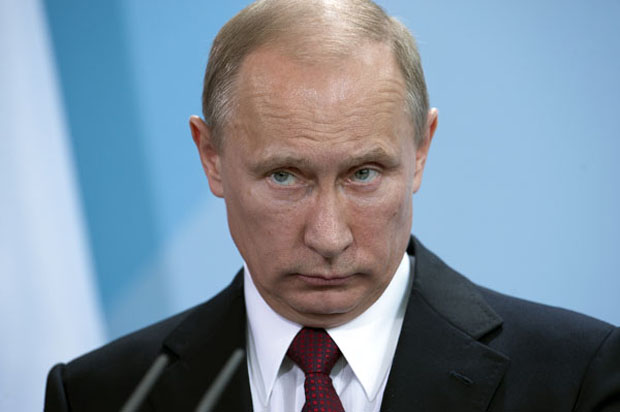
(Image: /Demotix)
Censorship of anti-war sentiment in Russia now uses a mixture of state-sponsored media attacks, arms-length loyalists, crooked think tanks and legal strong-arming – but is it working?
Politonline, a website well-known for its support of Putin, has produced an article with the top twenty most “negative” news sources in Russia. Editors claim to have pioneered a methodology which can gauge “emotional sentiment and tone” in online articles. Politonline don’t elaborate on how the algorithm has been put together, or indeed the source data they used. However some of the keywords used have been published, including the words “annexation” and “support for Crimea.”
Meanwhile, a prominent academic has been publically slammed by a pro-Putin think tank, in a pro-Putin newspaper, after he compared Hitler’s strategy in Anschluss with the annexation of Crimea. Professer Andrei Zubov was also dismissed by his employers – the Moscow Institute for International Relations. The Institute for Democracy and Co-operation, the think tank who critiqued the article, included a list of American academics who had lost their jobs over their political views – although many had been fired for comments which were overtly racist, sexist, or incited hate.
The man who blew the whistle on Putin’s invasion in Crimea, Lev Shlosberg, has also been targeted by his opponents. Some of the masked paratroopers now in Crimea were originally based in his home region : Shlosberg helped alert the media when the invasion began. A legislator and newspaper editor, he has since been accused of being a “fifth columnist” and “traitor.” In an interview on the Russia 1 television channel, Putin’s press secretary Dmitri Peskov adopted a similar strategy when he smeared dissenters as “professional critics” and a “nano-fifth column.”
Alexey Navalny, a lawyer, blogger and pro-reform opposition politician has also faced penalties. A lengthy article he published on his blog regarding Crimea prompted authorities to accuse him of breaking the terms of his house arrest. Authorities then blocked access to the site, and warned citizens that anyone promoting his article online would be subject to unspecified sanctions.
Protesters brave enough to go on the streets are also being met with state-sponsored aggression. Tanya Lokshina, Russia Program Director and Senior Researcher at Human Rights Watch, told Index that “anti-war protesters have been subject to arbitrary detention, harassment, intimidation, and even physical attacks.”
Between February 21st and March 4th, the NGO allege that police detained well over a thousand peaceful protesters in Moscow alone. Courts ordered at least fifteen of them to serve ten days of administrative detention for alleged failure to obey police orders, and fined dozens of others for participating in unauthorized public gatherings. The majority are still awaiting administrative court hearings. Other cities have seen similar policing tactics and unfair judicial process.
“Many wondered what a post-Sochi crackdown might look like,” Hugh Williamson, Europe and Central Asia director at Human Rights Watch told Index. “These detentions, the crackdown under way on the media, and violent attacks against dissenters by unidentified assailants paint a stark picture of what is going on in Russia right now.”
So is all this working? In December, Putin’s popularity was at its lowest since 2000, according to a report on the Reuters website. Polling conducted by the Levada Agency showed that “61 percent of respondents voiced approval for Putin’s performance in November, down from 64 percent in October and the previous low this year of 62 percent, recorded in January.”
It’s also notable that before the Crimea crisis escalated, the Russian people were indifferent to Euromaidan. Another Levada poll showed that 63% of Russians didn’t sympathise with either Yanukovych or the protesters.
However a poll by VTsIOM, conducted in March after troops had moved into Crimea, showed that Putin’s approval ratings had leapt up. VtsIOM is state-run but according to Russian politics analyst Mark Adomanis, “remains one of the most widely respected polling outfits in Russia.”
Crimea has sent Putin’s poll numbers skyrocketing,” says Adomanis, who writes a column for Forbes about Russian politics and economics. “Levada currently has him at a little over 80%, his highest level since 2010.”
“Other agencies have shown a similar rebound in his numbers – pretty much everyone agrees that the poll numbers are the best in a long time.”
Adomanis also commented on the lack of media, political and academic freedom surrounding the Ukraine crisis.
“Even in democratic societies there’s always a concern that polling can be heavily influenced by the nature of media coverage. It’s definitely more of a concern in Russia, given the heavy-handedness with which the authorities manage the press
“You can’t totally separate the biased coverage from popular support, but I don’t think one can fully explain the other.”
So Putin’s strategy in Crimea has played out well politically. It’s hard to know what the polls would have been like had the press been able to fully criticise his actions, or had street protests been allowed to go on unhindered. It’s also likely that the long-term economic impact of the annexation will be great enough to push polls down again in the future. However, the tactics used by the authorities to keep dissent out of the public psyche appear well-rehearsed and difficult to counter. A quick review of any Russia Today bulletin, compared with multiple on the ground sources in Kiev, Crimea and eastern Ukraine, reveal that the Russian public are not getting the full picture about their leaders international transgressions.
This article was published on April 14, 2014 at indexoncensorship.org
10 Apr 2014 | Academic Freedom, News, Politics and Society, Religion and Culture, Russia, United Kingdom

(Image: /Demotix)
At a conference in Prague last Spring, I listened as the wife of a former diplomat quizzed a Russian journalist on Russian politics. An old Cold War hand, she was keen to discover what motivated Putin and his cadre. Was it some hankering after communism? Was it plain nationalism?
The journalist, displaying the scepticism bordering on cynicism that, ironically, is often found among journalists bravely reporting in monstrous circumstances, shrugged. It would be a mistake, she suggested, to ascribe any value or ideology, even one as meagre as nostalgia, to the current Kremlin. Putin’s regime is about power and money and absolutely nothing else. There is no Putinism. There is just gangsterism.
It’s probably worth keeping this in mind while we fret over the geopolitics of Putin’s Crimean Anschluss. Indeed more than that, it’s clearly a point of view that merits more study. Unfortunately, one recent study of Putin’s gangster tendencies has been suppressed: not by the Kremlin, but by a UK academic publisher living in fear of England’s libel laws.
Karen Dawisha, Director of Miami University’s Havighurst Center for Russian and Post-Soviet Studies, was set to publish a book on Putin’s gangster connections. One hesitates to use the dread stock book review phrase “timely and relevant”, but in this case it seems difficult to avoid it. The proposed subtitle “How, why and when did Putin decide to build a Kleptocratic and Authoritarian Regime in Russia and what is its Future?” gives a pretty good impression of what the book would contain.
According to Ed Lucas at the Economist, Dawisha’s publishers, Cambridge University Press, has taken fright at the prospect of a book actually investigating gangsterism among Putin and his cronies, and decided it will not publish the book.
In a letter to Dawisha, published by the Economist, John Haslam of CUP noted:
“After discussion with legal colleagues who have reviewed the typescript from both a US and UK legal perspective, I’m afraid that our view is that we are not in a position to proceed with your book. The decision has nothing to do with the quality of your research or your scholarly credibility. It is simply a question of risk tolerance in light of our limited resources.”
Haslam goes on:
“We have no reason to doubt the veracity of what you say, but we believe the risk is high that those implicated in the premise of the book—that Putin has a close circle of criminal oligarchs at his disposal and has spent his career cultivating this circle—would be motivated to sue and could afford to do so. Even if the Press was ultimately successful in defending such a lawsuit, the disruption and expense would be more than we could afford, given our charitable and academic mission.”
This is depressing reading, and sadly familiar.
Six and a half years ago, Cambridge University Press was faced with a similar problem, and reacted in a similar fashion, i.e. capitulation.
Back then, publishers’ dreams were tormented not by Russian gangsters but Saudi bankers. Sheikh Khalid Bin Mahfouz was the scourge of Fleet Street’s inhouse legal teams. The Saudi, who had bought Irish citizenship from kleptocrat Taoiseach Charles Haughey, was notorious for issuing threats and writs to any publication or publisher that so much as mentioned him – particularly when it came to suggestions that he may have been linked, either personally or financially, to Osama Bin Laden.
Everyone I mentioned in that last paragraph is dead now, by the way, which is why I feel no qualms about writing about any of them.
When Index first wrote about Bin Mahfouz there were many, many fraught discussions and even arguments about how to proceed. That’s a big part of what campaigners, lawyers and hacks mean when they talk about the “chilling effect” of defamation laws. The knowledge of working on something that could be ruinuous not just personally, but for an entire publication, can make you queasy and put your colleagues on edge. The fact that Bin Mahfouz, worth over $3.2 billion dollars, could have tied up even the biggest publications in endless, expensive litigation tended to put people off. Even when people did publish, in the end they always backed down in the face of the Sheikh’s muscle. His personal website featured an entire section dedicated to apologies hastily issued by terrified newspaper legal departments after Bin Mahfouz threatened them with a trip to the High Court.
Anyway, in 2007, CUP were about to publish a book on funding for Islamist terror, called Alms For Jihad. Bin Mahfouz got wind of it, and issued the usual threats via his lawyers, Kendall Freeman. CUP apparently jumped through a few hoops, asking the book’s American authors, Robert O Collins and J Millard Burr to compile a letter countering the claims in bin Mahfouz’s book. But in the end they pulped the book and recalled library copies. It was a low point, but in a curious way, some good came out of it. The Alms For Jihad case was among those that highlighted the serious problems with English defamation law. Not long after the pulping of Alms For Jihad, the first stirrings of the Libel Reform Campaign began. On 1 January 2014, a new defamation law came into force.
So why are we seeing a repeat of the Alms For Jihad debacle with this book on Putin and his cronies?
The new law should make it harder for foreign litigants to sue in London, and it should make them prove that they have suffered genuine damage. Without having seen the contents of the book (CUP say there is no reason to doubt the veracity of Dawisha’s claims about Putin’s circle, while simultaneously refusing to stand by their author), one would imagine that, particularly given US and European moves against Putin’s inner circle, the book would have had a decent chance in court.
But the new law will need to be tested. It may be that while the legal barrier to putting up a spirited defence of free speech in court has been considerably lowered, the mental block remains for many publishers. Only a strong early ruling under the new law will shake this off.
But who’s going have the first go?
This article was published on April 10, 2014 at indexoncensorship.org
11 Mar 2014 | Europe and Central Asia, News, Russia
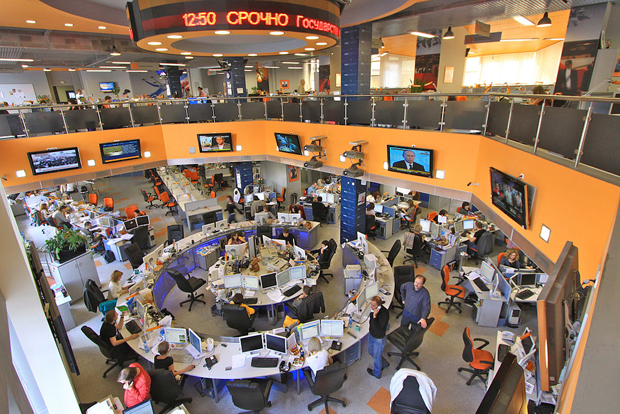
RIA Novosti newsroom (Image: Jürg Vollmer/maiak.info Reusse/Wikimedia Commons)
“I just got fired,” a RIA Novosti journalist told Index a few days ago. On 9 December 2013, a surprise decree by president Putin ordered the closure of the state-owned, 73-year-old RIA — one of Russia’s most established news services. It’s liquidation has now kicked in, and it will be replaced by a new agency named Rossiya Segodnya (“Russia Today”), headed by Dmitry Kiselyov, who made his name as an abrasive Kremlin-loyal television personality. Employees have had to choose between staying at the replacement agency or sign redundancy contracts. Most journalists at RIA’s well-respected English service are leaving. They have no intention of taking orders from Kiselyov, who is famous for his homophobic and anti-Western rants. He once said, on TV, that “fining gays is not sufficient — they should not be allowed to give blood, or sperm and in case of a car accident, their hearts should be burnt or buried as useless”.
With 60 offices abroad, RIA was a vast media empire presenting a wide range of information. In April 2013, over 9 million internet users visited its website, which made it the 11th most popular European news website. Christopher Boian, who directed RIA’s foreign language news website and helped make it more dynamic and more respected, told Index: “This was a big state-owned media outlet. It was unique. It seemed to reflect a maturity about the Russian media. We were not anti-Putin or pro-Putin but just trying to look objectively at what was going on.”
Rossiya Segodnya will share its editor in chief with the Kremlin-funded TV news channel RT. It is unlikely to strive for objectivity. In his first speech at RIA’s office, Kiselyov declared: “[Russia’s] post-Soviet journalism is unlike Western journalism in that it does not reproduce values, it produces them.” And added: “Objectivity is a myth which is proposed and imposed on us. Imagine a young man puts his hand on the shoulder of a girl, and in the best case, says ‘you know, I have long wanted to tell you that I regard you objectively.’ Is that what she is expecting? Not likely. In the same way our country — Russia — needs our love.”
In January, Dozhd, a popular independent TV channel which came to prominence for its coverage of anti-government protests in late 2011, was dropped by satellite and cable operators after it caused outrage publishing a poll asking readers whether Leningrad should have been surrendered to the Nazis in order to save hundreds of thousands of lives. Putin’s press secretary Dmitry Peskov declared that the “station had crossed all the limits of what can be tolerated” and that the question posed by the survey was an offence “much more serious from the point of view of morality and ethics”. The channel has now lost around 80 per cent of its audience and, as a result, most of its advertisers. It’s facing imminent closure.
“The situation does not look promising. Things seem to have been orchestrated, as five independent operators dropped us in a matter of weeks, but we can’t prove they have been,” Pavel Lobkov, a veteran journalist who was dismissed from federal channel NTV in 2012 — for what he alleges were political reasons — and found a new home in Dozhd, tells Index. “When it comes to the press, the threat is not direct anymore. The strategy is now more refined. It’s like chess”, he adds.
In February, Ekho Moskvy (Echo of Moscow), one of Russia’s few independent broadcasters, majority-owned by Gazprom-Media — the media arm of the gigantic conglomerate that is one of the bases of Kremlin power — encountered difficulties. Its head was dismissed and replaced by an editor from state media, after a reshuffling of the board of directors tilted the balance in favour of pro-government people. Alexei Venediktov, Ekho’s long-standing editor, has just been reelected by the journalists at the station, though his position still needs to be approved by the board.
“As soon as Putin became president, he moved against the media and made sure national TV was under control – which proved to be a very effective tool,” Maria Lipman, chair of the Carnegie Moscow Centre’s Society and Regions Program, told Index. Financial and legal leverage was used to shut down media outlets that were seen as potential threats. In 2000, the independent TV channel NTV — which had been critical of the war in Chechnya — was acquired by Gazprom-Media, its owner forced to flee the country and its editorial line changed. “What remained were oases of non governmental media. The government was permissive because there was no political opposition. You could make noise, but no one would pick it up,” Lipman adds.
According to her, a new crackdown began in 2012 with the return of Putin to power in the wake of big protests. A series of dismissals took place and a few publications closed down — always explained by economic factors. “Gradually there was a sense that the realm of free expression was shrinking, that there were fewer jobs to be found and more self censorship,” she says.
The recent years have seen an unprecedented increase in the concentration of media ownership, with huge media properties accumulating in the hands of a few Kremlin loyalists. These include Yuri Kovalchuk, a member of Putin’s close circle dubbed “Russia’s Murdoch”, who owns the National Media Group, or Alisher Usmanov, Russia’s richest man (who fired the editor of Kommersant Vlast in 2011 for having published pictures with anti-Putin slogans in an issue alleging election fraud). Usmanov recently acquired control over VKontakte, Russia’s largest social network, whose founder has left Russia. Lobkov tells me he believes the Kremlin’s next target will be the internet. In January, parliament passed a law giving the state powers to close blacklisted websites.
“The Kremlin has been sophisticated enough not to go against individuals or editors. Its favourite tool is to exert its influence through media owners,” Lipman says, pointing out that not every case of pressure against a media outlet necessarily comes from the government, as there are “competitions, personal scores, a combination of factors.” Dozhd owners say their troubles started after they reported on the expensive properties owned by certain Kremlin officials.
“Following recent events in Ukraine, the propaganda on national media has been extremely intense. State media has presented the picture of a fascist coup inspired by the west. For anyone interested there is no shortage of information on the web. When the crisis subsides it remains to be seen whether the outlets that have covered it in a different fashion will be punished,” Lipman says.
Last week, Izvestia newspaper reported that a United Russia party deputy is readying legislation that would, among other things, make it a crime to “allow publications of false anti-Russian information.” The tightening of control over the Russian media is likely to continue.
This article was posted on March 11, 2014 at indexoncensorship.org
7 Feb 2014 | Europe and Central Asia, News, Russia

(Image: Gonçalo Silva/Demotix)
The Sochi Winter Olympics opening ceremony is taking place today, and organisers have declared that a record 65 world leaders are attending. But numbers alone don’t tell the whole story. As it turns out, some of the biggest names in global politics will not be in the stands cheer on their athletes as the games are officially kick off. Indeed, quite a few won’t be taking the trip to Sochi at all. Barack Obama is sending a delegation including openly gay figure skater Brian Boitano in his place, and Angela Merkel, David Cameron and Francois Hollande are also staying away.
But while the International Olympic Committee’s Thomas Bach was less than impressed by the apparent boycott, labelling it an “ostentatious gesture” that “costs nothing but makes international headlines”, the absence of the big guns does give the lesser-known world leaders a chance to shine. Not all guests have been confirmed, but we’ve got the low-down on some of the the leaders the cameras might pan to during today’s festivities, or who could be spotted in the slopes over the coming weeks.
Alexander Lukashenko
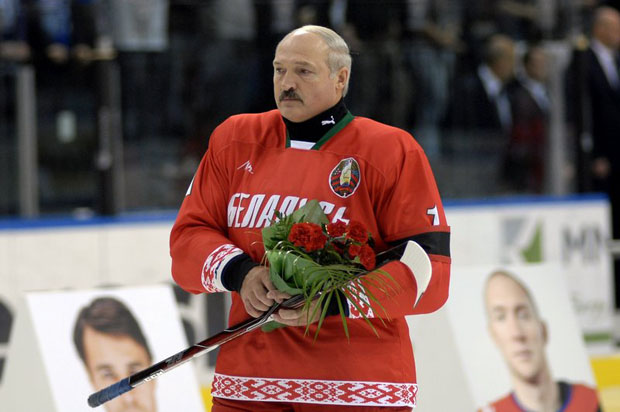
(Image: Ivan Uralsky/Demotix)
Putin’s long time colleague and fellow ice hockey enthusiast surely wouldn’t miss the Winter Olympics for the world. The Belarusian president is known as “the last dictator in Europe”, his near 20 years in power having passed without a single free and fair election. Under his leadership, peaceful protests have been violently dispersed, and civil society activists and political opposition — including rival candidates from the 2010 presidential elections — have been jailed. A brand new report from Index also concludes that: “Belarus continues to have one of the most restrictive and hostile media environments in Europe.”
Recep Tayyip Erdoğan

(Image: Philip Janek / Demotix)
The Turkish president made global headlines last summer, over his regime’s violent crackdown on the peaceful Gezi park demonstrations. Rather than accepting the protests were a manifestation of genuine grievances by his people, he blamed “foreign hands” and their “domestic collaborators” like many a less-than-democratic leader before him. His government was recently implicated in a big corruption scandal, and only yesterday, parliament approved controversial amendments to the country’s internet law. The new law, opposed by civil society, the opposition and international organisations alike, gives the government wide-reaching powers over the internet, effectively allowing them to block websites without court rulings, and gives them access to user data.
Viktor Yanukovych
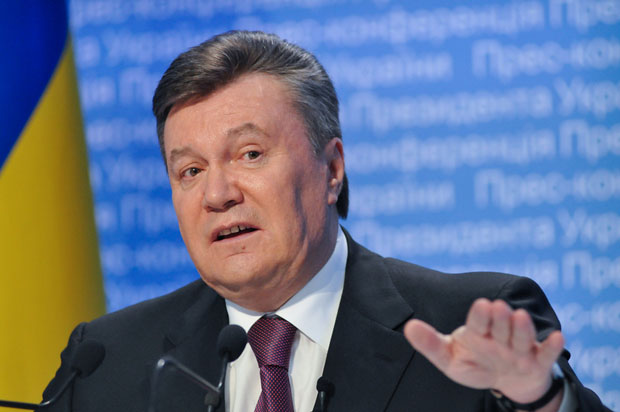
(Image: Oleksandr Nazarov/Demotix)
The Ukrainian president’s failure to sign a treaty securing closer ties with the EU in November, sparked the country’s ongoing Euromaidan protests. The authorities response was heavy handed — police clashed with demonstrators and journalist were targeted, leading to international condemnation. They authorities even briefly implemented a highly repressive new law, among other things allowing security services to monitor the internet, and defining NGOs receiving funding from abroad as “foreign agents”. The law was, however, scrapped only days later following outrage from civil society. Meanwhile,Ukraine’s Prime Minister and government also stepped down, while Yanukovych took four days off ill. He’s back in the office now — just in time head to Sochi for a much-hyped meeting with Putin.
Nursultan Nazarbayev
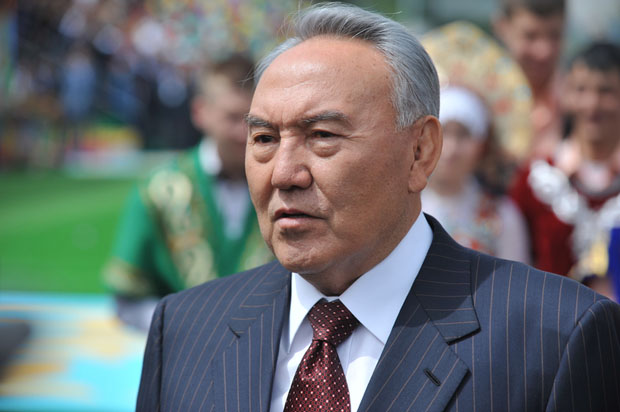
(Image: Vladimir Tretyakov/Demotix)
Kazakhstan’s president has been in power since 1991, and during that time, allegations of human rights abuses, including attacks on demonstrators and independent media, as well as widespread corruption have been regularly levelled at him. In 2012, following clashed between the police and striking workers, the president, who already effectively controls the legislature and the judiciary, further extended his emergency powers. But Putin wouldn’t even be his only high-flying friend. In September, Kanye West performed at his grandson’s wedding. The reported price tag? $3 million. Did I mention the accusations of corruption? Meanwhile, former British prime minister Tony Blair spent two years advising Nazarbayev and his government on democracy and good governance — a deal which “produced no change for the better or advance of democratic rights in the authoritarian nation”.
Emomali Rahmon
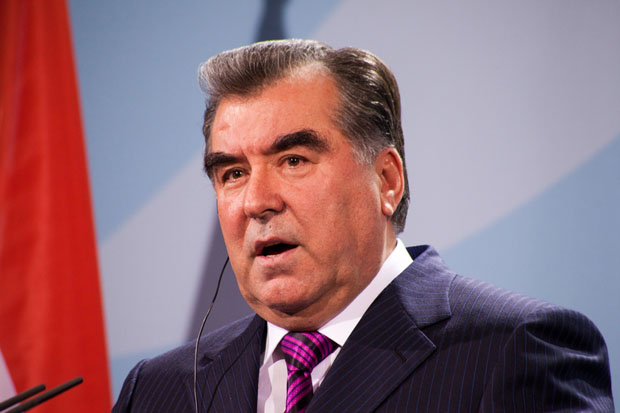
(Image: Riccardo Valsecchi/Demotix)
He has been the head of the government of Tajikistan since 1992, and was in power during the country’s civil war, where 100,000 people lost their lives. Allegations of human rights abuses, including torture by security forces and arbitrary arrests, are widespread. Much of the media is state-controlled, and independent journalists face violence and intimidation. “Publicly insulting the president” can see you jailed for as long as five years. Recently, a prominent member of the opposition, Zaid Saidov, was sentenced to 26 years in prison following what has been described as a “politically motivated trial”. In Sochi, he is set to meet with not only Putin, but also Chinese leader Xi Jinping.
This article was posted on February 7 2014 at indexoncensorship.org







